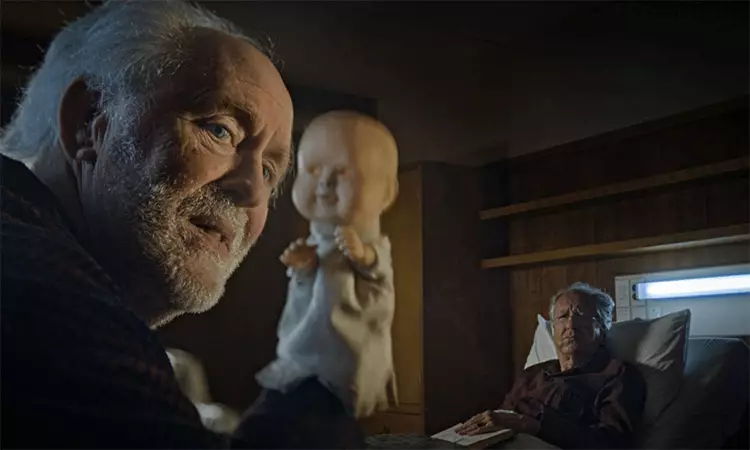The upcoming dark horror film “The Rule of Jenny Pen” presents a chilling exploration of authority and vulnerability. Set in the confines of a dreary aged care home, it delves into the psyche of its main character, Judge Stefan Mortensen, portrayed by the esteemed Geoffrey Rush. After surviving a near-fatal stroke, Mortensen finds himself trapped not only by his physical limitations but also within the oppressive atmosphere of a facility governed by a manipulative resident. The film sets the stage for a dramatic clash between Mortensen’s lingering ideals of law and order and the chaotic tyranny embodied by the malevolent Dave Crealy, played by John Lithgow.
At the heart of the story lies the palpable tension between Mortensen—a figure once associated with justice—and Crealy, who’s revealed to be a sinister puppet master lurking beneath a façade of niceness. Crealy’s use of a dementia doll as a tool for psychological manipulation recasts what would typically be perceived as innocence into a weapon of cruelty. This juxtaposition of Mortensen’s past as a powerful judge against his current state of helplessness in a retirement home offers a potent commentary on the fragility of dignity and respect in later years. The film effectively contrasts the fading powers of Mortensen against the predatory instincts of Crealy, making for a compelling character study within a horror framework.
The Unanswered Pleas: A Reflection of Society
Mortensen’s deterioration of agency is compounded by a staff that is either oblivious or uncaring towards his plight. This theme resonates deeply in our contemporary society, where many feel ignored or invalidated, especially within institutional settings. The unwillingness of those in authority to listen to the vulnerable serves as a stark reminder of the gaps in our healthcare systems and elder care policies. As Mortensen realizes the futility of relying on the staff, he decides to confront Crealy himself—a move that highlights not only his desperation but also the instinct to fight for one’s own survival when all else fails.
Under the direction of James Ashcroft—known for his work in “Coming Home in the Dark”—the film promises to meld psychological thrills with horror elements, making the environment of the aged care home a character within itself. The claustrophobic and eerie atmosphere will elevate the narrative, creating a tangible sense of dread as Mortensen confronts not only Crealy but the deeper terrors lurking within the human psyche. Through skilled direction and powerful performances from the cast, “The Rule of Jenny Pen” is set to become a thought-provoking horror film that encapsulates the stark realities of aging, power dynamics, and the darkness that can manifest when civilization’s structures break down.
In essence, “The Rule of Jenny Pen” emerges as an engrossing examination of personal strength and psychological turmoil in the face of insidious control. It raises urgent questions about morality, authority, and the overlooked lives of the elderly, ensuring that the suspense it builds is not merely for scares but also serves as a profound social commentary.

